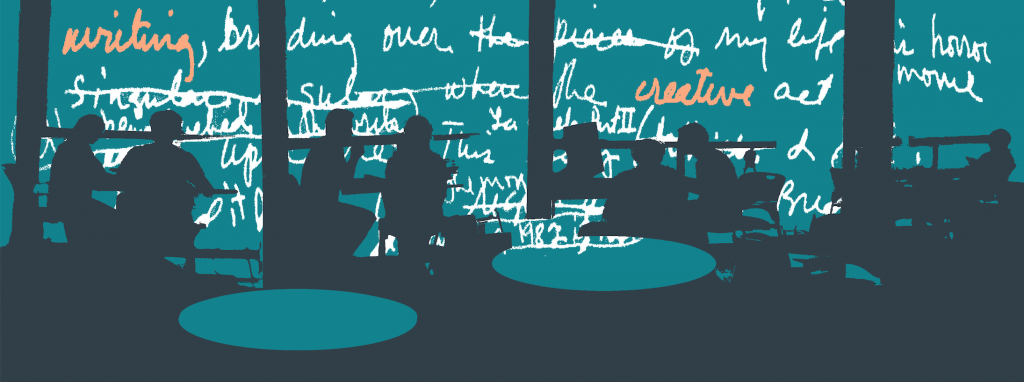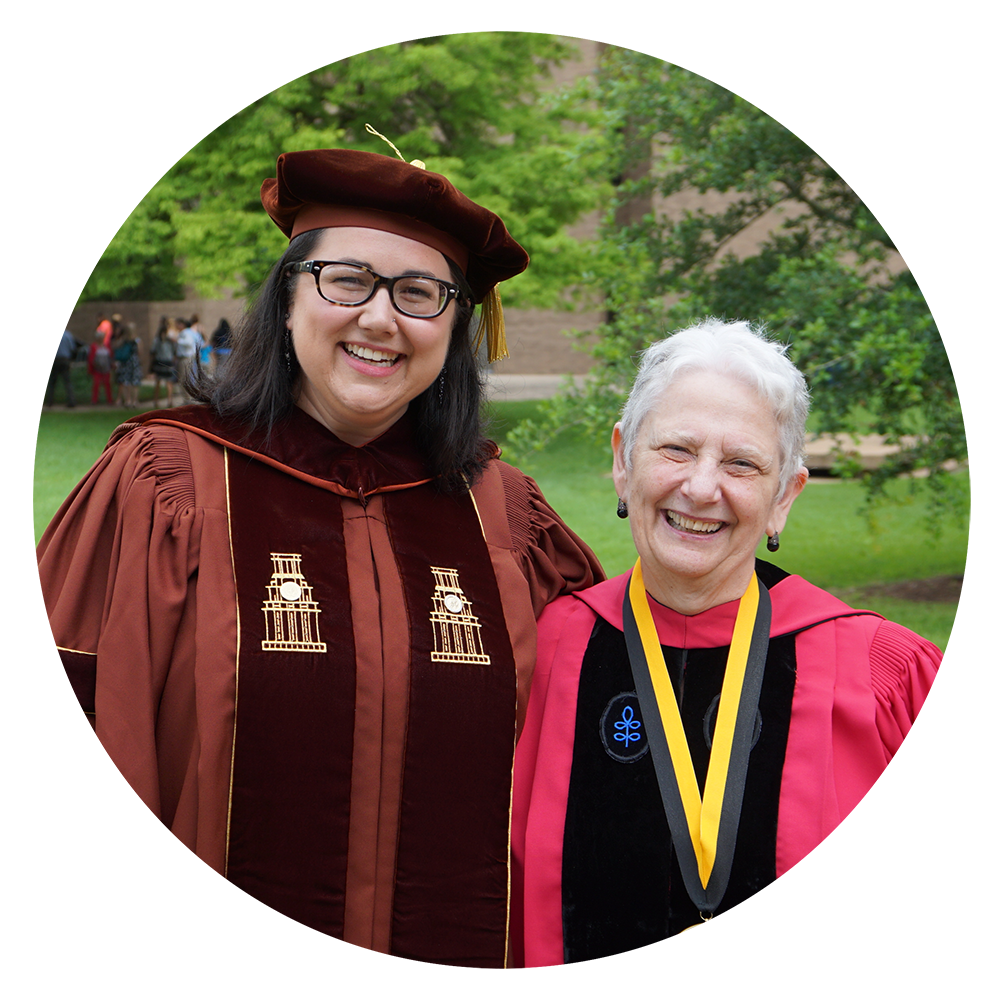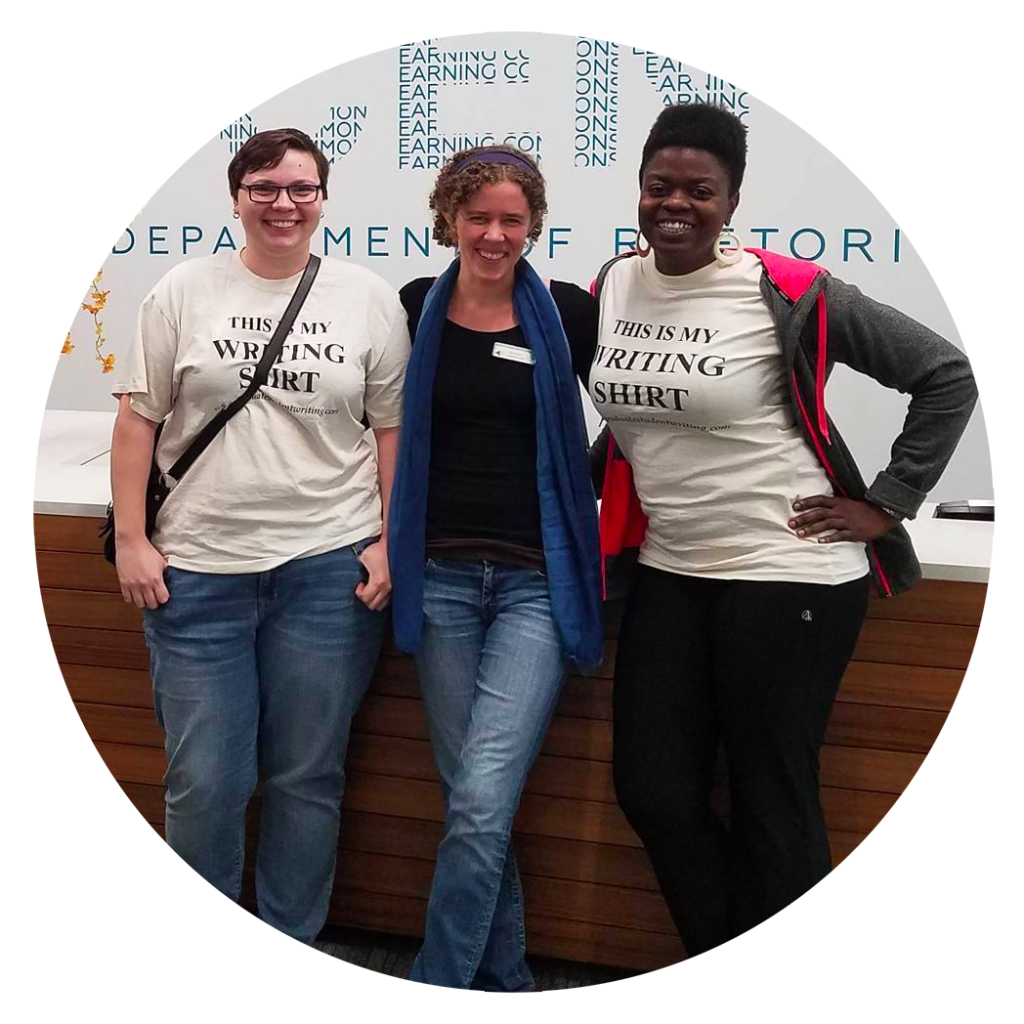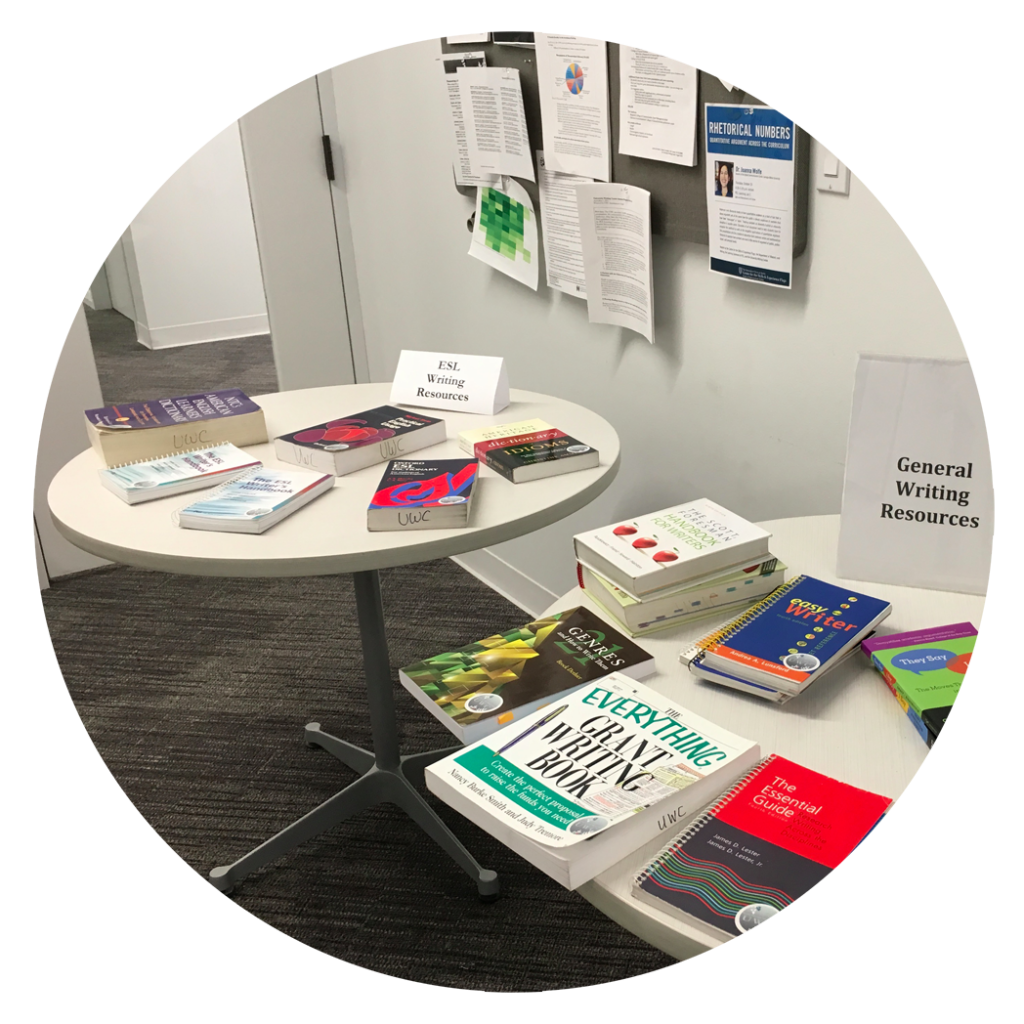
The UWC provides free programs to support and empower all UT graduate students as readers, writers, and communicators. Our trained graduate student consultants provide one-on-one feedback on any project at any stage of your writing process.
There is no charge for our services, which are generously supported by the Office of Graduate Studies and the College of Liberal Arts.
Services
We offer both in-person and online consultations for graduate students. We follow university policy regarding COVID-19 safety precautions about gathering in-person for consultations and monthly writing retreats.
Writing Appointments
Graduate students can book writing appointments as needed but no more than one per day. For more information about UWC policies and to schedule an appointment, click here. Couldn’t schedule an appointment? Please let us know here.
Writing Groups
We offer weekly group sessions for goal setting, progress check-ins, and sustained quiet writing to help you stay focused and accountable.
Writing Retreats
All-day writing retreats provide a quiet, distraction-free space for you to work on any writing project at any stage alongside your peers.
Workshops
We offer instructional and interactive workshops to help strengthen your writing skills and practices.
Presentations
We offer presentations on a variety of topics. You may request a presentation for a class you teach or for a student organization you’re a part of.
Resources
We have resources for academic writers of all stages, including handouts, presentations, and helpful links. Some grad-specific handouts are listed below.
Want regular updates about graduate services and events?
Success Stories

Hear firsthand from writers who recently finished their PhDs with help from the UWC.
Looking for additional support as you apply for
jobs?
FAQs
There is no charge for our services, which are generously supported by the Office of Graduate Studies and the College of Liberal Arts.
Graduate students can schedule up to four individual consultations per month.
Graduate students can schedule only one 45-minute consultation per day. This policy supports the UWC’s mission of helping writers to build independent writing and revision skills. It also ensures that our consultants will be available to meet with the multiple writers who seek our services each day.
Exceptions to this policy (longer appointments and multiple consecutive appointments) are available only as accommodations for students with disabilities. Visit our accessibility page to find out more.
Anything and everything! We offer support for seminar papers, Master’s theses, and dissertations, but we also work with all other sorts of projects, including: fellowship and grant applications, book reviews, teaching philosophy statements, dissertation acknowledgement pages, draft responses for qualifying exams, and emails to editors. If it’s a genre we’re not familiar with, we’ll draw on our in-house library and our colleagues to learn about it.
Our Graduate Peer Consultants are advanced graduate students in a variety of fields of study. They are experienced academic writers and are trained in non-directive, non-evaluative consultation techniques.
The UWC employs 10-15 peer graduate consultants, so it is not possible for consultants to represent the full range of over 130 academic departments at UT. We welcome new consultants from all disciplines; please visit our Jobs page to apply to work with us.
Yes, we frequently work with writers who are multilingual writers. For additional support, click here to learn about UT’s International Office and the resources they offer for multilingual writers.
Consultants are happy to provide help with sentence-level issues such as clarity, grammar, and correct usage, but we do not copy-edit or proofread writers’ drafts. Instead, we ask questions about your writing/revision goals and help you learn ways to meet those goals independently. For example, if you want to focus on improving grammar and punctuation, a UWC consultant may read a portion of your draft, identify main areas to focus on in revision (such as run-on sentences or comma usage), and work with you to practice sample revisions in those areas, using our handbooks and online resources for reference. Our goal is not to “fix” your draft, but to equip you with strategies that you can use to revise the draft yourself and continue using in future writing projects.
If you are interested in hiring an editor, visit our “Hire an Editor” page. We recommend searching Austin Freelancers or the national Editorial Freelancers Association (not affiliated with the UWC). For general guidance on copyediting services, we recommend Professor Wendy Laura Belcher’s overview: how to hire and work with an academic copyeditor.
No, we can only work with drafts during consultations. Consultants can review up to 8 pages of writing during a consultation.
Yes. Upon request, the UWC offers consultations in Reduced Distraction Rooms. You can indicate your preference for a Reduced Distraction Room when you check in on the day of your appointment.
Yes. Click here to learn more about accessibility at the UWC.
We employ graduate students from all departments as consultants. Our consultants receive initial and ongoing training in consultation techniques, including training for working with multilingual writers. They also participate in activities that develop their professional skills, such as research, community outreach, public speaking, and editing for publication. To learn more about working with us, visit our Jobs page.
At this time, all UWC Writing Groups are interdisciplinary. Advisors and peers within your department can offer feedback and guidance specific to your field, but UWC Writing Groups focus on practices that are common to writers across disciplines, including sustained writing, time management, and goal-setting.
The UWC has online resources for academic writers of all stages, including presentations, videos, and handouts that cover everything from grammar to citation styles. Presentations developed specifically for graduate students include
Transitioning from College to Graduate Writing and
The Dissertation Genre and Professional Writing Habits.
Recommended Resources Beyond UT:
- Purdue OWL – general writing/revision resources, including exercises in grammar and citation.
- Navigating the PhD – workshop series at Michigan State University’s Writing Lab, which addresses writing and other common grad student concerns (such as managing time and building professional relationships).
Resources for Grad Students
Additional Resources
- ChatGPT & LLMs_2023 (consultants, graduate, undergrad)
- Code-Switching and Code-Meshing (consultants, general, graduate, instructors, undergrad)
- Crafting Your Research Story (video) (graduate)
- Developing Writing Partnerships (40-50min) (general, graduate)
- Entrepreneurship Resources (general, graduate, undergrad)
- Hire an Editor (consultants, general, graduate, instructors, undergrad)
- How to Conduct Peer Review (interactive workshop) (graduate)
- Metadiscourse (video) (graduate)
- Psychology CVs (graduate, undergrad)
- RHE 306 Recommended Presentations Schedule (consultants, graduate, undergrad)
- Resources for Multilingual Writers (general, graduate, instructors, undergrad)
- Résumé-Writing Resources (general, graduate, undergrad)
- Song Starter Outline (consultants, general, graduate, undergrad)
- Starting a Writing Group (graduate, teachers)
- Starting a Writing Group (video) (graduate)
- Writing Groups (45-50min) (general, graduate)
Grammar, Usage, & Punctuation
Research Papers and Lab Reports
The Basics
- Avoiding Plagiarism (25-35 min) (general, graduate, undergrad)
- Avoiding Plagiarism (25-35 min) Activity (general, graduate, undergrad)
- Graduate Services at the UWC (15-20 min) (general, graduate)
- Grammarly Presentation (30-35 min) (consultants, graduate, undergrad)
- Introduction to Graduate Student Services (video) (graduate, instructors)
Writing Guides
- Close Reading Literature (consultants, graduate, undergrad)
- Cover Letters (general, graduate, undergrad)
- How to Construct and Format a Resume (general, graduate, undergrad)
- Personal Statements (general, graduate, undergrad)
- Personal Statements: Models for Generating Content (general, graduate, undergrad)
- Transitioning from College Writing to Graduate Writing (30-40 min) (general, graduate)
- Writing Effective Internal Transfer Essays ( 35-45 min. ) (consultants, general, graduate, undergrad)
- Writing Resumes, CVs, and Cover Letters (45-50min) (general, graduate, undergrad)

